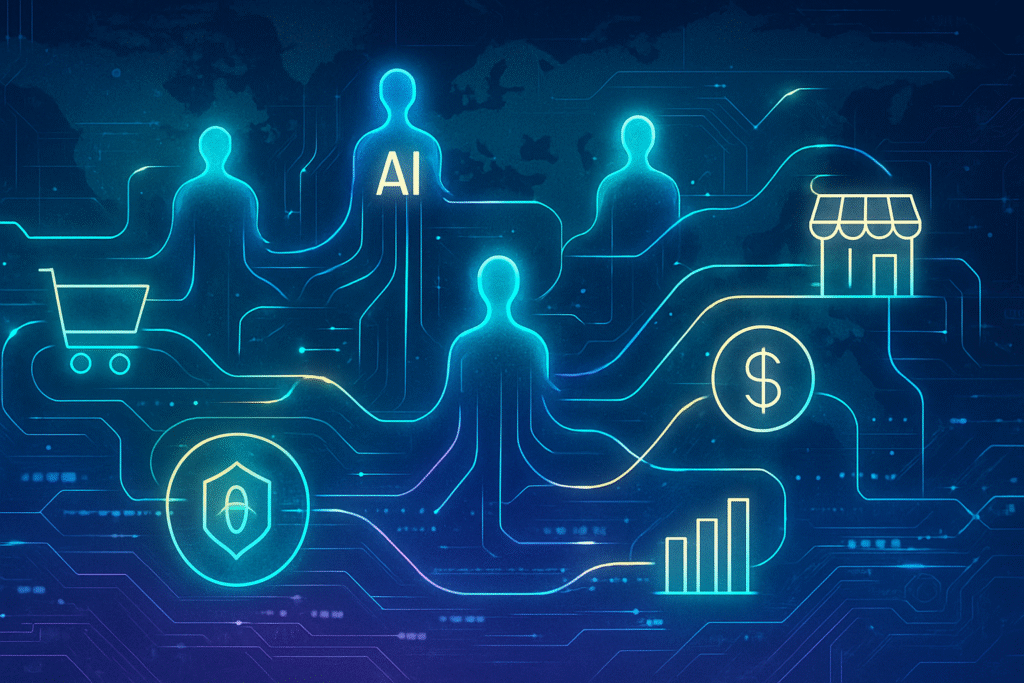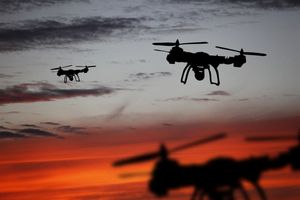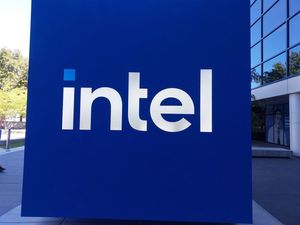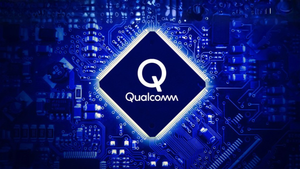
Globant (NYSE: GLOB) has announced the highly anticipated launch of Globant Enterprise AI (GEAI) version 2.3, a groundbreaking update that integrates the innovative Agentic Commerce Protocol (ACP). Unveiled on October 6, 2025, this development marks a pivotal moment in the evolution of enterprise AI, empowering businesses to adopt cutting-edge advancements for truly AI-powered commerce. The introduction of ACP is set to redefine how AI agents interact with payment and fulfillment systems, ushering in an era of seamless, conversational, and autonomous transactions across the digital landscape.
This latest iteration of Globant Enterprise AI positions the company at the forefront of transactional AI, enabling a future where AI agents can not only assist but actively complete purchases. The move reflects a broader industry shift towards intelligent automation and the increasing sophistication of AI agents, promising significant efficiency gains and expanded commercial opportunities for enterprises willing to embrace this transformative technology.
The Technical Core: Unpacking the Agentic Commerce Protocol
At the heart of GEAI 2.3's enhanced capabilities lies the Agentic Commerce Protocol (ACP), an open standard co-developed by industry giants Stripe and OpenAI. This protocol is the technical backbone for what OpenAI refers to as "Instant Checkout," designed to facilitate programmatic commerce flows directly between businesses, AI agents, and buyers. The ACP enables AI agents to engage in sophisticated conversational purchases by securely leveraging existing payment and fulfillment infrastructures.
Key functionalities include the ability for AI agents to initiate and complete purchases autonomously through natural language interfaces, fundamentally automating and streamlining commerce. GEAI 2.3 also reinforces its support for the Model Context Protocol (MCP) and Agent-to-Agent (A2A) communication, building on previous updates. MCP allows GEAI agents to interact with a vast array of global enterprise tools and applications, while A2A facilitates autonomous communication and integration with external AI frameworks such as Agentforce, Google Cloud Platform, Azure AI Foundry, and Amazon Bedrock. A critical differentiator is ACP's design for secure and PCI compliant transactions, ensuring that payment credentials are transmitted from buyers to AI agents without exposing sensitive underlying details, thus establishing a robust and trustworthy framework for AI-driven commerce. Unlike traditional e-commerce where users navigate interfaces, ACP enables a proactive, agent-led transaction model.
Initial reactions from the AI research community and industry experts highlight the significance of a standardized protocol for agentic commerce. While the concept of AI agents is not new, a secure, interoperable, and transaction-capable standard has been a missing piece. Globant's integration of ACP is seen as a crucial step towards mainstream adoption, though experts caution that the broader agentic commerce landscape is still in its nascent stages, characterized by experimentation and the need for further standardization around agent certification and liability protocols.
Competitive Ripples: Reshaping the AI and Tech Landscape
The launch of Globant Enterprise AI 2.3 with the Agentic Commerce Protocol is poised to send ripples across the AI and tech industry, impacting a diverse range of companies from established tech giants to agile startups. Companies like Stripe and OpenAI, as co-creators of ACP, stand to benefit immensely from its adoption, as it expands the utility and reach of their payment and AI platforms, respectively. For Globant, this move solidifies its market positioning as a leader in enterprise AI solutions, offering a distinct competitive advantage through its no-code agent creation and orchestration platform.
This development presents a potential disruption to existing e-commerce platforms and service providers that rely heavily on traditional user-driven navigation and checkout processes. While not an immediate replacement, the ability of AI agents to embed commerce directly into conversational interfaces could shift market share towards platforms and businesses that seamlessly integrate with agentic commerce. Major cloud providers (e.g., Google Cloud Platform (NASDAQ: GOOGL), Microsoft Azure (NASDAQ: MSFT), Amazon Web Services (NASDAQ: AMZN)) will also see increased demand for their AI infrastructure as businesses build out multi-agent, multi-LLM ecosystems compatible with protocols like ACP.
Startups focused on AI agents, conversational AI, and payment solutions could find new avenues for innovation by building services atop ACP. The protocol's open standard nature encourages a collaborative ecosystem, fostering new partnerships and specialized solutions. However, it also raises the bar for security, compliance, and interoperability, challenging smaller players to meet robust enterprise-grade requirements. The strategic advantage lies with companies that can quickly adapt their offerings to support autonomous, agent-driven transactions, leveraging the efficiency gains and expanded reach that ACP promises.
Wider Significance: The Dawn of Transactional AI
The integration of the Agentic Commerce Protocol into Globant Enterprise AI 2.3 represents more than just a product update; it signifies a major stride in the broader AI landscape, marking the dawn of truly transactional AI. This development fits squarely into the trend of AI agents evolving from mere informational tools to proactive, decision-making entities capable of executing complex tasks, including financial transactions. It pushes the boundaries of automation, moving beyond simple task automation to intelligent workflow orchestration where AI agents can manage financial tasks, streamline dispute resolutions, and even optimize investments.
The impacts are far-reaching. E-commerce is set to transform from a browsing-and-clicking experience to one where AI agents can proactively offer personalized recommendations and complete purchases on behalf of users, expanding customer reach and embedding commerce directly into diverse applications. Industries like finance and healthcare are also poised for significant transformation, with agentic AI enhancing risk management, fraud detection, personalized care, and automation of clinical tasks. This advancement compares to previous AI milestones such by introducing a standardized mechanism for secure and autonomous AI-driven transactions, a capability that was previously largely theoretical or bespoke.
However, the increased autonomy and transactional capabilities of agentic AI also introduce potential concerns. Security risks, including the exploitation of elevated privileges by malicious agents, become more pronounced. This necessitates robust technical controls, clear governance frameworks, and continuous risk monitoring to ensure safe and effective AI management. Furthermore, the question of liability in agent-led transactions will require careful consideration and potentially new regulatory frameworks as these systems become more prevalent. The readiness of businesses to structure their product data and infrastructure for autonomous interaction, becoming "integration-ready," will be crucial for widespread adoption.
Future Developments: A Glimpse into the Agentic Future
Looking ahead, the Agentic Commerce Protocol within Globant Enterprise AI 2.3 is expected to catalyze a rapid evolution in AI-powered commerce and enterprise operations. In the near term, we can anticipate a proliferation of specialized AI agents capable of handling increasingly complex transactional scenarios, particularly in the B2B sector where workflow integration and automated procurement will be paramount. The focus will be on refining the interoperability of these agents across different platforms and ensuring seamless integration with legacy enterprise systems.
Long-term developments will likely involve the creation of "living ecosystems" where AI is not just a tool but an embedded, intelligent layer across every enterprise function. We can foresee AI agents collaborating autonomously to manage supply chains, execute marketing campaigns, and even design new products, all while transacting securely and efficiently. Potential applications on the horizon include highly personalized shopping experiences where AI agents anticipate needs and make purchases, automated financial advisory services, and self-optimizing business operations that react dynamically to market changes.
Challenges that need to be addressed include further standardization of agent behavior and communication, the development of robust ethical guidelines for autonomous transactions, and enhanced security protocols to prevent fraud and misuse. Experts predict that the next phase will involve significant investment in AI governance and trust frameworks, as widespread adoption hinges on public and corporate confidence in the reliability and safety of agentic systems. The evolution of human-AI collaboration in these transactional contexts will also be a key area of focus, ensuring that human oversight remains effective without hindering the efficiency of AI agents.
Comprehensive Wrap-Up: Redefining Digital Commerce
Globant Enterprise AI 2.3, with its integration of the Agentic Commerce Protocol, represents a significant leap forward in the journey towards truly autonomous and intelligent enterprise solutions. The key takeaway is the establishment of a standardized, secure, and interoperable framework for AI agents to conduct transactions, moving beyond mere assistance to active participation in commerce. This development is not just an incremental update but a foundational shift, setting the stage for a future where AI agents play a central role in driving business operations and customer interactions.
This moment in AI history is significant because it provides a concrete mechanism for the theoretical promise of AI agents to become a practical reality in the commercial sphere. It underscores the industry's commitment to building more intelligent, efficient, and integrated digital experiences. The long-term impact will likely be a fundamental reshaping of online shopping, B2B transactions, and internal enterprise workflows, leading to unprecedented levels of automation and personalization.
In the coming weeks and months, it will be crucial to watch for the initial adoption rates of ACP, the emergence of new agentic commerce applications, and how the broader industry responds to the challenges of security, governance, and liability. The success of this protocol will largely depend on its ability to foster a robust and trustworthy ecosystem where businesses and consumers alike can confidently engage with transactional AI agents.
This content is intended for informational purposes only and represents analysis of current AI developments.
TokenRing AI delivers enterprise-grade solutions for multi-agent AI workflow orchestration, AI-powered development tools, and seamless remote collaboration platforms.
For more information, visit https://www.tokenring.ai/.





